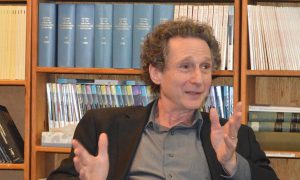Facing Race in Psychoanalysis

Michael Moskowitz, Ph.D. visited BGSP for a colloquium this month on “Racism in Psychoanalysis.” Associate Producer of the film, Black Psychoanalysts Speak, Dr. Moskowitz has been instrumental in drawing together Black psychoanalysts to shed light on the previously unspoken problem of racism in psychoanalysis. As he points out, “African Americans are clearly more underrepresented in psychoanalysis than in any comparable profession. We can’t just write this off as a demographic glitch. We must try to elucidate the group dynamics that have led to this state.”
Black Psychoanalysts Speak starts to do just that. According to Psychoanalytic Electronic Publishing, which published the film as its 2013 Video Grant Award winner, “The film is intended to raise awareness of the need for greater openness and understanding of cultural and ethnic pressures in psychoanalytic training, in transferential and countertransferential interactions, and in the recruitment of people of color into psychoanalytic training.” Dr. Moskowitz is also Associate Producer of the 2016 film, Psychoanalysis in El Barrio.
Founding Chair of the Diversity Committee at the Institute for Psychoanalytic Training and Research (IPTAR) in New York, Dr. Moskowitz emphasized the need to integrate the perspectives of psychoanalysts of color throughout the entire psychoanalytic training curriculum, not just in “a diversity course.” He said, “There is a large and growing literature by black psychoanalysts, but none of it has been made a part of the psychoanalytic canon.” He cited, for instance, Black psychoanalyst Anton Hart, a preeminent scholar on Donald Winnicott, whose work should be included in the developmental curriculum of analytic training programs. “Anton Hart,” Dr. Moskowitz commented, “is a Winnicott scholar, but he always gets asked to teach the diversity course.”
Heeding his own advice, Dr. Moskowitz assigned two readings, “Racism as a Transference State: Episodes of Racial Hostility in the Psychoanalytic Context” by Forrest M. Hamer and “Surviving Hate and Being Hated: Some Personal Thoughts About Racism from a Psychoanalytic Perspective” by Kathleen Pogue White, for BGSP’s advanced clinical case seminar. He led seminar participants in the discussion of two cases, exploring how critical it is to be willing to focus on cultural context, including racism, when conducting analysis. Seminar leader, BGSP President Jane Snyder, says the seminar emphasized the necessity of integrating psychoanalytic understanding with “recognition of the inevitably traumatic effects of racism and other forms of discrimination.” She comments that ignoring questions of race, ethnicity, and gender leads to a major gap in the analysis. “If you and your analyst don’t talk about these important aspects of your experience, you both are ignoring an important element of what you’ve been through.” Dr. Snyder adds, “There is a bigger question of how we process and move beyond the effects of racism in this country, but not talking about it will get us nowhere. How do we talk about it without ending up in a standoff between rage and guilt? The film Black Psychoanalysts Speak offers suggestions; it is a hopeful film.”
“Psychoanalysts,” she concludes, “have been too quick to pathologize when they don’t understand something, because psychoanalysts can’t stand not knowing. It’s contradictory to the aims of the profession, but it’s the truth.”
MICHAEL MOSKOWITZ, Ph.D. is on the faculty of the Institute for Psychoanalytic Training and Research (IPTAR), the New York University Postdoctoral Program in Psychotherapy and Psychoanalysis, and the New York University School of Social Work. He was the founding chair of the IPTAR Diversity Committee. Dr. Moskowitz is the author of articles on psychoanalytic theory, organizational dynamics, morality, culture, race and ethnicity, and is also a co-editor of three books including Reaching Across Boundaries of Culture and Class: Widening the Scope of Psychotherapy. He is the author of Reading Minds: A Guide to the Cognitive Neuroscience Revolution (2010).




